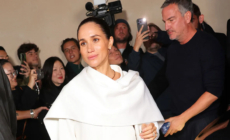-
PM Viktor Orbán to Personally Negotiate with Donald Trump amid Energy Concerns - 6 mins ago
-
Students evacuated during raid of illegal East L.A. fireworks lab - 31 mins ago
-
A New Chance for Peace in Cyprus? | Opinion - 33 mins ago
-
Shohei Ohtani Hits 2 Homers, Ties 119-Year-Old Record In Dodgers’ World Series Game 3 Win - 35 mins ago
-
Major Road and Rail Developments to Boost Budapest Airport Access - 39 mins ago
-
Fuel Prices to Rise Again After New U.S. Sanctions on Russia - about 1 hour ago
-
International student arrivals take a dive under Trump - about 1 hour ago
-
She Found Out Colleague Earns $18K More for Same Role—Reason Sparks Outrage - about 1 hour ago
-
4 Takeaways From the Dodgers’ World Series Game 3 Win over the Blue Jays - about 1 hour ago
-
Meghan Markle’s team shake-up raises concerns about Hollywood brand - 2 hours ago
US-China Talks: Three Things To Watch as Trump Meets Xi
U.S. President Donald Trump is scheduled to meet with his Chinese counterpart Xi Jinping on Thursday in Busan, South Korea, for a long-anticipated dialogue.
The summit—Trump’s first with Xi since beginning his second term in January—is set to take place on the sidelines of the Asia-Pacific Economic Cooperation (APEC) forum and follows a weekend of trade negotiations in Malaysia, with both sides expressing optimism about a shared framework.
At a news conference on Monday, spokesperson Guo Jiakun declined to elaborate, saying only that China would release additional information “in a timely manner.” Newsweek contacted the Chinese Embassy in Washington, D.C., and the White House for comment via email.
Below are three high-stakes issues to watch closely, with each carrying major implications for the global economy.
Trade
The U.S. is unlikely to proceed with the 100 percent tariff hike on Chinese goods that Trump threatened earlier this month—what would have been the sharpest escalation since April in the current trade war. The tariffs, which were set to take effect on November 1, are now “effectively off the table,” U.S. Treasury Secretary Scott Bessent said on Sunday in an interview with CBS News’ Face the Nation.
Trump had floated the tariff increase in response to new Chinese export licensing rules announced in May that covered products containing even trace amounts of rare earth elements.
China controls over two-thirds of the world’s rare earths, a group of 17 minerals vital to producing technologies such as electric vehicles and missile guidance systems. Washington has raced in recent months to secure supply deals with partners, including Australia and Canada, to reduce its dependency on Beijing.
It remains unclear whether China will postpone the restrictions, which are set to take effect in December, but Bessent said he believes “progress is being made.”
Movement is also expected on U.S. soybean exports, the country’s largest agricultural export. Sales to China, the world’s largest soybean importer, ground to a halt this year amid retaliatory tariffs from Beijing. Analysts expect some resumption of Chinese purchases, though not at pre-trade war levels, as China continues to diversify imports from Brazil and Argentina to strengthen food security.
Bessent told Face the Nation that American farmers would be “extremely happy with this deal for this year and for the coming years.”
TikTok
Washington and Beijing are also expected to finalize a TikTok agreement hammered out during September’s talks in Madrid, with Bessent saying “the details are ironed out” and that only Trump and Xi’s signatures remain.
The video-sharing app, with 170 million U.S. users, has been at the center of a national security debate amid bipartisan concerns that its Chinese parent company, ByteDance, could share user data—or algorithmic insights—with Beijing.
Under the current deal framework, an American consortium led by Oracle would take an 80 percent stake in TikTok’s U.S. operations, with ByteDance retaining 20 percent. Critics warn that unless ByteDance fully relinquishes control of the algorithm, Americans could still be exposed to potential influence by the Chinese Communist Party.
Taiwan
Before departing for Asia, Trump told reporters that Taiwan would be a key topic in his meeting with Xi.
China claims sovereignty over the self-governing island and has not ruled out the use of force to achieve unification. Xi has called Taiwan a “red line” and has intensified pressure through large-scale military drills and near-daily warplane sorties across the median line of the Taiwan Strait.
The U.S. has long maintained a policy of “strategic ambiguity,” providing arms and political support to Taipei without explicitly committing to its defense.
Trump has faced criticism from pro-Taiwan lawmakers for comments suggesting the island should pay “protection money” and for blocking $400 million in military aid this summer. He also drew backlash for allegedly denying Taiwanese President Lai Ching-te a stopover in New York during his Latin American tour.
U.S. Defense Secretary Marco Rubio, traveling with Trump in Japan, downplayed these fears. He told reporters, “I don’t think you’re going to see some trade deal where … we’re going to get favorable treatment on trade in exchange for walking away from Taiwan.”
Source link





























